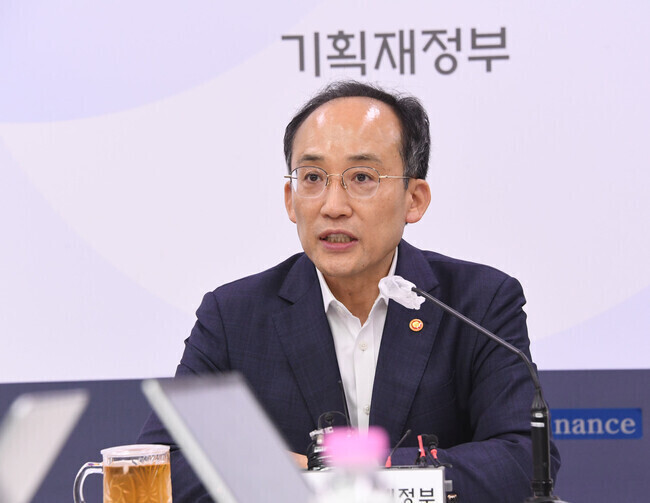hankyoreh
Links to other country sites 다른 나라 사이트 링크
[Guest essay] Is this really the best the conservatives can manage?


The Yoon Suk-yeol administration’s policy focus ever since taking office has been on the idea of solving livelihood issues through growth.
It’s a conceivable solution, given how the slowdown in Korea’s growth rate since the 1990s has been accompanied by rising inequality. People in general also tend to believe that conservatives are good at things having to do with the economy, too.
These kinds of declarations from conservative administrations tap into the desire of ordinary Koreans to ride accelerated growth into affluence. But the likelihood of that actually happening is almost nonexistent.
The logic that lower taxes lead to economic growth is more or less a myth. As the economist Paul Krugman has pointed out, the boom in the US between 1982 and 1984 — which conservatives tend to treat as gospel — was not the product of the Ronald Reagan administration’s tax cut policies. Instead, it was the result of a baseline effect compared with the artificial economic slump created by rapidly rising interest rates in the late 1970s, coupled with easy money policies that sharply lowered interest rates in 1982.
An even bigger paradox is the fact that the Reagan administration stoked demand by a combination of tax cuts and increased debt to prevent the economy from crashing. In effect, it went into debt to fill the fiscal gap created by the lower taxes. Contrary to the conservative gospel, the tax cut policies of the George W. Bush administration led to an economic recession, with the death knell finally coming in the form of a financial crisis.
The same was true for the tax cuts introduced by the Lee Myung-bak administration here in South Korea. Lee’s administration lowered the corporate tax rate from 25% to 22% and defanged the comprehensive real estate tax, slashing the tax burden for companies and wealthy people.
But those tax cuts did nothing to rescue the economy or restore livelihoods. Throughout Lee’s presidency, the average annual growth rate was 3.2% — far below the levels during the Kim Dae-jung and Roh Moo-hyun administrations. Critics said the tax cuts had only contributed to padding the internal reserves of the chaebols.
The problem is that like the Reagan administration before it, the Lee administration also increased the issuance of government bonds to make up for the fiscal shortfall resulting from the tax cuts.
While government bond issuance averaged 5.6 trillion won annually over the 10 years of the Kim and Roh administrations, the annual average reached 20 trillion won during the Lee era — nearly quadruple the levels during liberal administrations. The Park Geun-hye administration promised “welfare without higher taxes,” but it ended up having to raise taxes to fill the fiscal hole created by the earlier tax cuts.
In spite of these facts, the Yoon administration has said it plans to cut taxes once again for wealthy people and chaebol in order to “promote economic vitality and stabilize livelihoods.” Bafflingly, the minister of economy and finance has claimed that these tax cut policies are a matter of adjusting the South Korean economy to meet the “global standard.” It’s not clear what standard he could be talking about.
The global standards emphasized by institutions like the International Monetary Fund and World Bank over the course of the global financial crisis and pandemic have had to do with the active role that governments need to play in reducing inequality. That’s the only way for economies to escape long-term stagnation to achieve continuous growth.
Surely the minister is not so unaware of the situation in the world that he is under the false impression that policies popular a few decades ago are still valid today. At the same time, you also have to ask the question: If you’re going to work toward meeting the global standard, why aren’t you doing that in terms of labor and social services?
Yoon admits that this is his “first time” being president, and that he’s unversed in policies outside of his area of expertise — that is, investigations. Even if we take that into account, there’s no way that the minister of economy and finance or other officials and experts with practical decision-making powers are unaware of the facts.
It’s impossible to tell why they keep parroting the same unscientific claims about how lower taxes for rich people and corporations lead to a better economy and livelihoods. They’re not the only ones either, even the People Power Party is behaving like a rookie ruling party that has never been in charge before.
Is this the best the conservatives can manage? At the time when first the pandemic and now inflation have been dragging the economy down and threatening working- and middle-class lives, the “solution” they offer consists of the kinds of tax cuts that offer far more benefits to the wealthy while potentially triggering more inflation. Looking at this administration, you get the sense that the public’s belief that conservatives are “better at the economy” is really off base.
Tax cuts are not the global standard, and they aren’t something we should be attempting at a time of inflation and economic crisis. What the Yoon administration should be doing is tending to people’s endangered livelihoods in a way that aligns with conservative principles.
They need to stop making feeble excuses about how there’s no money to do that. They could come up with over 60 trillion won (nearly US$46 billion) in five years just by reversing the planned tax cuts and the reduction in fuel taxes, which have had no tangible impact on the vast majority of South Koreans.
That money can be used in a conservative-appropriate way to expand selective social services targeting vulnerable populations, including a more realistic calculation of the standard median income. This is essential in an era of inflation, and it’s not at all challenging for those with a grasp of global economic trends and basic math.
The conservatives in charge do have their pride. But shouldn’t they be trying to avoid failing grades in their policies for livelihoods and the economy?
Please direct questions or comments to [english@hani.co.kr]

Editorial・opinion
![[Column] Park Geun-hye déjà vu in Yoon Suk-yeol [Column] Park Geun-hye déjà vu in Yoon Suk-yeol](https://flexible.img.hani.co.kr/flexible/normal/500/300/imgdb/original/2024/0424/651713945113788.jpg) [Column] Park Geun-hye déjà vu in Yoon Suk-yeol
[Column] Park Geun-hye déjà vu in Yoon Suk-yeol![[Editorial] New weight of N. Korea’s nuclear threats makes dialogue all the more urgent [Editorial] New weight of N. Korea’s nuclear threats makes dialogue all the more urgent](https://flexible.img.hani.co.kr/flexible/normal/500/300/imgdb/original/2024/0424/7317139454662664.jpg) [Editorial] New weight of N. Korea’s nuclear threats makes dialogue all the more urgent
[Editorial] New weight of N. Korea’s nuclear threats makes dialogue all the more urgent- [Guest essay] The real reason Korea’s new right wants to dub Rhee a founding father
- [Column] ‘Choson’: Is it time we start referring to N. Korea in its own terms?
- [Editorial] Japan’s rewriting of history with Korea has gone too far
- [Column] The president’s questionable capacity for dialogue
- [Column] Are chaebol firms just pizza pies for families to divvy up as they please?
- [Column] Has Korea, too, crossed the Rubicon on China?
- [Correspondent’s column] In Japan’s alliance with US, echoes of its past alliances with UK
- [Editorial] Does Yoon think the Korean public is wrong?
Most viewed articles
- 1‘We must say no’: Seoul defense chief on Korean, USFK involvement in hypothetical Taiwan crisis
- 2‘Weddingflation’ breaks the bank for Korean couples-to-be
- 3[Reportage] On US campuses, student risk arrest as they call for divestment from Israel
- 4[Column] Park Geun-hye déjà vu in Yoon Suk-yeol
- 5Amnesty notes ‘erosion’ of freedom of expression in Korea in annual human rights report
- 6Korea sees more deaths than births for 52nd consecutive month in February
- 7N. Korean delegation’s trip to Iran shows how Pyongyang is leveraging ties with Moscow
- 8Will NewJeans end up collateral damage in internal feud at K-pop juggernaut Hybe?
- 9[Guest essay] The real reason Korea’s new right wants to dub Rhee a founding father
- 10N. Korean hackers breached 10 defense contractors in South for months, police say